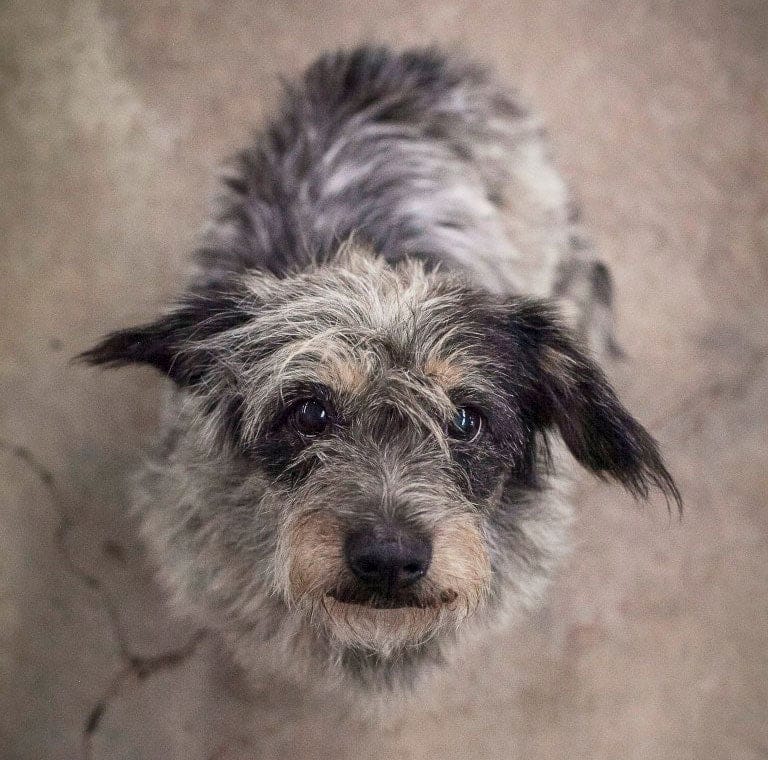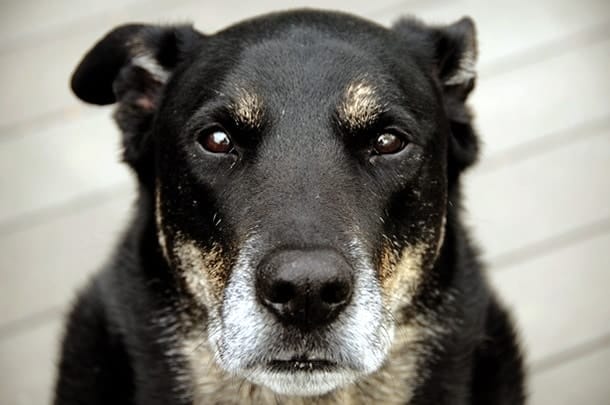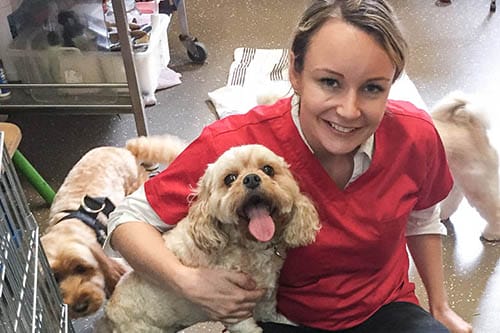A member of your family is getting on in years, and it’s hard to know how to care for them. No, I’m not talking about Great Aunty Gladys, I’m talking about your furry canine friend. And while it’s true that looking after a senior pet is as much, if not more, challenging as when you first brought them home, modern advances in nutrition and medicine are making it easier on both you and your doggie counterpart. Today, pets are living longer, and with the right care and treatment, very comfortably!
What is a Senior Dog?
Senior dogs can be classified 7 years and over in small dogs and 5 years and over in large dogs (>25kg). These are just rules of thumb, as nutritional, genetic and environmental factors will also determine life expectancy.
Here are some tips on caring for your pooch when the years begin to get the better of them.
Veterinary Tip 1: Don’t mistake Disease for ‘Old Age’
A common error made by senior dog owners, is confusing actual disease for old age. Veterinarians too often hear the words ‘he’s just getting old’ as a reason why, for example, their dog can’t jump in the car or is slower on walks or is drinking more or seeming confused. It’s important to know that ‘old age’ is not a disease in itself, but rather disease is more common in old age. A lot of these diseases may have treatments to help increase longevity and more importantly, increase quality of life for senior dogs.
You may not know, but your dog is a wonderful actor. They are incredibly good at hiding signs of disease. Hiding disease is an inbuilt, natural selection tool that helps animals survive in the wild. The take-home point here is that if you are noticing something is amiss with your dog, it probably is! Report any unusual signs to your vet to see if they are of concern. You know your pet best!
 Emily the 11 year old Maltese X Cattle Dog
Emily the 11 year old Maltese X Cattle Dog
Veterinary Tip 2: Have a senior dog checked by the vet more regularly
Have a senior dog checked by the vet every 6 months (equivalent to 2-3 human years) and ideally have their baseline bloods and urine concentration checked annually (every 4-6 human years). At the 6-monthly check, your vet should take a thorough medical history and do a clinical examination. The things they will be watching for in the history that may indicate a problem include:
- Changes in appetite.
- An increase or decrease in water intake.
- Changes in mobility, for example, not jumping in the car or down from the couch or table as they previously did, stiffness after lying down for a while.
- Changes in demeanour including lethargy or confusion.
- Changes in tolerance to exercise including not going for as long on runs, becoming ‘puffed’ more quickly.
- Changes to behaviour including soiling inside, interacting less with family members, seeming confused, agitated or aggressive.
- Hearing or vision loss.
- Vomiting, diarrhoea or straining to defecate or urinate.
- Changes to the skin or coat.
- Changes to respiration including coughing or panting more frequently.
- Skin lumps you may have noticed.
- Changes to grooming habits including an increase or decrease.
The 6-monthly physical examination should include the following:
- Weight – weight loss or gain can be assessed and either one could be significant to your senior dog’s health.
- Abdominal Palpation (feeling the abdomen) – this assesses liver and kidney size/shape, checks for any signs of abdominal pain, checks for constipation or urinary obstruction and importantly checks for any unusual masses or thickenings.
- Temperature – healthy animals should have a temperature of 38.5 +/- 0.5, however a stressed animal that has just jogged to the clinic then played with the other dogs in the waiting area, may have a slightly higher reading. The vet will decide on the significance of this.
- Cardiac and thoracic auscultation (listening to your dogs heart and chest sounds) to check for heart murmurs, lung crackles, reduced heart sounds, irregular heart beat, rate of the heart beat etc.
- A check of the skin, eyes and ear canals.
- An orthopaedic check including range of motion of joints, assessing for joint pain may be warranted.
- A dental check (dental health will be discussed later).
- Assessment of colour and hydration (colour is checked by looking at your pets gums).
Veterinary Tip 3: Early Intervention is better than ‘Crisis Management’
An annual blood and urine check is essential for highlighting systemic signs of illness that may be undetectable on clinical examination alone.
Blood tests routinely check for the following:
- Elevated liver values – may be indicative of liver, intestinal, neoplastic (cancerous) or endocrine disease.
- Increases in kidney enzymes – kidney disease is best detected and treated EARLY!!! An increase in the kidney enzymes or elevation from baseline (why baseline bloods are important) combined with dilute urine is almost always indicative of kidney damage. Waiting until ‘crisis point’ ie. When there is noticeable weight loss, vomiting, inappetance or anorexia etc will mean treatment is not as effective in terms of increasing pet longevity and quality of life.
- Endrocrine Disease – commonly encountered endocrine diseases (eg. Hypothyroidism, diabetes and Cushings disease) are discussed below.
- Anemia – this can be indicative of any chronic disease process, blood loss or cancer.
- Changes in electrolytes, Calcium, Protein levels and other biochemical parameters are also assessed.

Veterinary Tip 4: Exercise is extremely important in old age, especially for dogs with arthritis
Older dogs with arthritis can often seem less interested in exercising, but reducing their exercise can be a vicious downward cycle in terms of joint health. Weight-bearing promotes the release of synovial fluid, which is the nutrition for the joint. Exercise also builds muscle mass, which helps to protect the joints. Therefore, the less exercise your dog does, the more the joints can deteriorate, and the less exercise they will want to do! The best kind of exercise for older dogs are longer, slower walks vs. tearing around after a ball. Slow daily walks and swimming are excellent for older pets. Sometimes, your pet may require treatment for arthritis, for example anti-inflammatories, to help assist keeping a healthy exercise regime and to reduce the pain of arthritis. Always check with your vet to see what options are best for your individual dog.
Veterinary Tip 5 : Nutrition is important
Senior dogs are less able to cope with deficiencies and excesses of various nutrients, so home-formulated meals may not be the best option as they age. All nutrients should be within the ideal range for an older dog, and it should be emphasised that this can be hard to do with a home-formulated food.
Good quality senior diets are especially formulated such that they are slightly lower in protein and phosphorus to help protect against kidney disease, high in anti-oxidants to help slow the aging process, are higher in omega-3s to help joint, skin and kidney health. They are also higher in fibre, which helps digestion and weight control.
A common mistake is to ‘add a bit of chicken’ to the dry food diet to make it ‘taste a bit better’. By doing this you are often adding in the protein that has been carefully reduced in the diet to protect kidney function.
These diets are generally quite palatable and often it is just a matter of getting your dog used to something different. Weaning a dog onto a new food should be a slow and gentle process, but in a lot of cases it is worth persisting.
Veterinary Tip 6: Teeth matter
Did you know that the health of your pet’s mouth can affect the overall health and well-being of your pet? Just like us, maintaining a healthy set of teeth reduces the load of bacteria that will not only form within the mouth, but can spread through the bloodstream, posing a risk, especially to older pets. Routine dental checks and ultrasonic scaling when necessary can also help save your pet from painful extractions involving longer periods of anaesthesia when they are older.
Veterinary Tip 7: Know your enemy and fight them early!
Finally, below is a set of diseases commonly affecting older pets, possible treatment options and a brief reason why treating early is a good idea.
| Disease | Signs you may notice | Treatment options | Why treat early? |
|---|---|---|---|
| Diabetes | Increased water intake, weight loss, hind-leg weakness | Insulin, changes to diet | Untreated can lead to life-threatening ketoacidosis and death. Treated, pets can live a normal and happy life |
| Arthritis | Inability to jump into car/onto couch, table etc, reduced appetite, aggression for no other reason, stiffness after rest | Pain relief/ anti-inflammatories, special diets eg. Hills J/D (joint diet), joint supplements (oral and injectable) | Arthritis is painful and can severely affect your pet’s quality of life! Treatment options should always be discussed with your veterinarian |
| Cushings Disease | Increased water intake, increased appetite, hair loss, lethargy, muscle weakness, pot-belly appearance, increased panting | Medication is available to lower levels of steroid hormone in the blood | Untreated can lead to increased risk of infection, obesity, liver disease. |
| Hypothyroidism | Lethargy, inactivity, mental dullness, weight gain, hair loss or excessive shedding, dry or lusterless hair coat, scaling skin, increased skin pigment, recurrent skin infections | Thyroid supplementation | Treatment increases activity levels, decreases the risk of obesity and protects against chronic skin problems |
| Kidney Disease | Increased water intake, weight loss, vomiting, diarrhea or constipation | Kidney-protective diets for example Hills K/d (Kidney Diet) or Royal Canin renal diet, fluids to maintain hydration, drugs to help kidney blood flow, symptomatic treatments for vomiting and/or diarrhea, drugs to help lower phosphorus levels, appetite stimulants | Early treatment has been shown to increase life-span. This is a key disease to diagnose as early as possible. |
| Cancer | Can vary from no signs to signs including weight loss, vomiting, diarrhea, lethargy, respiratory distress, coughing | Surgical resection if possible, chemotherapy, pain management | Surgical resection is often more successful if performed early |
| Canine Cognitive Disease | Disorientation, reduced interaction with family members, night waking and vocalisation, loss of housetraining, inactivity | Diets high in anti-oxidants eg. Hills B/D (brain diet) have shown to help some dogs with loss of toilet training, oral therapies | Can slow the progression of this disease |
| Cardiac Disease | Reduced tolerance to exercise (not going as far as once did on walks), coughing, weight loss, reduced appetite | There is an array of oral medication that can significantly prolong the length of your pet’s life with heart disease. Diets with reduced levels of sodium eg. Hills H/D (heart diet) can also help | Early diagnosis before the pet goes into congestive heart failure requiring crisis management is important |
In conclusion, there is a lot that can be done to help your dog become an old dog! Correct nutrition, dental care and regular check ups help to ensure a long, happy and healthy life.

Dr Abbie Tipler, BVSc, MACVS (Surgery)
Dr Abbie is a Small Animal Veterinarian with 10 years full-time experience. Her passion is Small Animal Surgery and in 2011 she studied towards and obtained her Memberships in Small Animal Surgery from the Australian College of Veterinary Scientists. Although surgery is her special interest, she loves all aspects of General Practice, especially canine medicine. She lives with her family and two Ragdoll cats.


